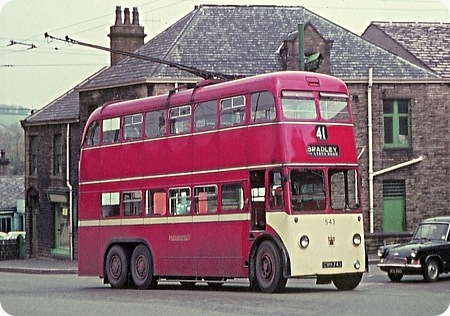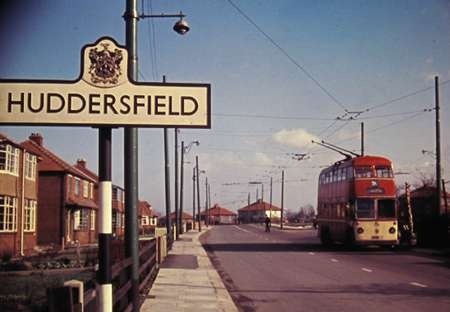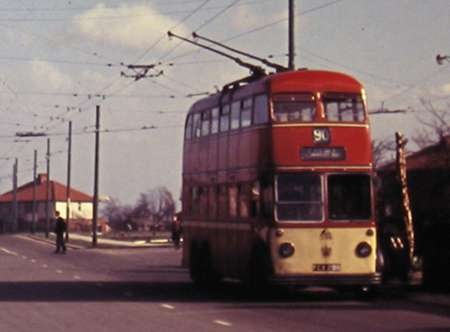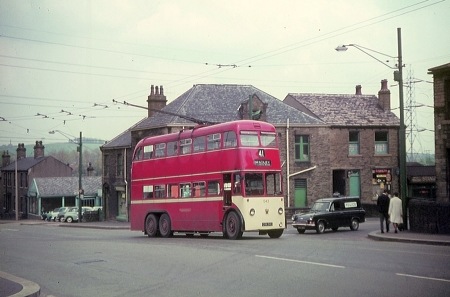Huddersfield Corporation
1947 rebodied 1961
Karrier MS2
East Lancs H40/32R
On a day trip to Huddersfield on 30th May 1967 I travelled on service 40 to Bradley, Leeds Road on 543. Trolleybuses were replaced by motor buses on this cross town route to Longwood a few weeks later on 12th July. In those relatively traffic free days the trolleys could easily turn in the wide junction on the main A62 Leeds Road at Bradley which is now a major multi lane traffic signal controlled intersection. Had I known more about the system then I would have travelled on the other half of the service to the more picturesque Longwood terminus where after from negotiating narrow streets the trolleys turned by reversing on to a concrete platform built out above the sharply falling ground.
Photograph and Copy contributed by Ian Wild
01/09/11 – 11:03
The sight of the trolleybuses poised on that “built out” platform at Longwood always makes me literally cringe with terror. The effects of even a minor brake or other failure, or possibly the slippery wet sole of a driver’s shoe, don’t bear thinking about. I’ve had to do a few hair raising manoeuvres in my time but nothing to compare with this. As a matter of interest, I wonder if there ever were actually any mishaps at this location ??
Chris Youhill
01/09/11 – 11:06
Huddersfield had a strong tradition for re-bodying its trolleybuses and started a scheme in 1950 when 28 pre-war Karrier E6 were done by Roe and this continued with the post-war Karrier MS2 and Sunbeam MS2 from 1955 to 1962. Both Roe and East Lancs supplied new bodies for these MS2s and 41 were done.
I have very fond memories of this fleet and fortunately did ride on most of the routes including the marvellous service to Marsden in the days when many of the original Park Royal Karrier E6s were still in service.
Lovely memories Ian and thank you for this posting of 543.
Richard Fieldhouse
01/09/11 – 11:09
The concrete platform at the Longwood terminus was actually built as a trolleybus turntable, one of only two in the UK the other one being at Christchurch on the Bournemouth system.
On 13th February 1967 Sunbeam S7A 634 of 1959 reversed too far and toppled over into the field below. It was badly damaged and never ran again. In 1965 634 became the last trolleybus in the Huddersfield fleet to receive a full repaint.
For some reason all the Huddersfield trolley’s that were re-bodied were always referred to as rebuilds.
Eric
As requested a closer view of 543.

01/09/11 – 17:57
With respect to the occasion at Longwood when 634 toppled off the reversing platform and ended its career, I had an interesting conversation last year with a fine chap who had been a fitter at Longroyd Bridge depot for years about just this particular incident.
He told me that he knew the chap who had been driving 634 that day, and emphasised what a good young driver he was. Apparently he’d started off on trolleys, had switched over to motor buses, and not long before the accident, had resumed work on the trolleybuses again.
He suggested that during the reversing manoeuvre, 634 had rolled back rather quicker than normal, and the lad panicked a bit, and not thinking straight, had accidentally put his foot on the accelerator instead of the brake pedal, the controls on the trolleys being the reverse of the normal configuration fitted to buses.
According to this gent, the bus wasn’t damaged that badly at all in the fall, but the recovery men made such a mess of getting the vehicle back on its feet that it was summarily written off, a fact which obviously still very much bothered him some forty-three years later!
Out of interest, there’s a photograph of the unfortunate 634 lying in the shrubs and trees off to the side of the turntable in the David and Charles book “The History of the British Trolleybus” published many moons ago.
Dave Careless
02/09/11 – 07:27
Gosh Dave, what a frightening tale about an event which I’m so sorry happened, and especially to a good driver – so regrettably my fears seem to have been justified. I imagine that the driver and conductor must surely have been injured ?? The turntable at Christchurch in Bournemouth was an odd affair but at least it was on terra firma and, being hand operated by the crew, the operation was at speed slow enough to virtually preclude anything untoward.
Chris Youhill
02/09/11 – 07:29
Apparently the batch of which 543 was one of them were actually Sunbeams but all had Karrier badges for some reason.
Spencer
02/09/11 – 11:14
There is another picture of 634 suspended in mid air during recovery operations in “Huddersfield Trolleybuses” by Stephen Lockwood published by Middleton Press in 2002
Eric
02/09/11 – 11:15
The matter of car/bus throttles being between clutch and throttle in the ‘thirties has been mentioned before, but not the reversal of the ‘throttle’ and ‘brake’ positions on trolleybuses. Whether it was universal (it was certainly common), I’m not sure, but I am sure that these aberrations were certainly dangerous! And especially in cases where bus/trolleybus drivers interchanged.
Chris Hebbron
02/09/11 – 11:35
Karrier badged MS2 trolleybuses were also supplied to South Lancashire Transport as 66 to 71 but they were taxed as Sunbeams. As Huddersfield was the “spiritual home” of Karrier up to 1935, it is understandable that they wanted their MS2 trolleybuses badged as Karriers. However this was short-lived as Rootes sold the Sunbeam and Karrier Trolleybus interests to Brockhouse Engineering in 1946, but retained the Karrier name for their use on specialist local authority vehicles such as dust carts and tower wagons.
Richard Fieldhouse
02/09/11 – 14:43
To take the Karrier story on a further step, after the sale to the Rootes Group in July 1935, the bus building part of the business was transferred from Huddersfield to the Sunbeam Moorfield Works in Upper Villiers Street, Wolverhampton, which Rootes had also acquired in October of the same year. Then, in December 1935, AEC became interested in Sunbeam, and the managing director C. W. Reeve and the chairman of AEC both joined the board. Out of this came the production of a Sunbeam bus built on an AEC chassis but powered by a Gardner engine, but very few were sold. By the end of the war AEC had decided to dispose of its interest in Sunbeam, and it was sold to the Brockhouse Group in 1946. The trolleybus side of the business was purchased by Guy from Brockhouse in January 1949, and from then on, all trolleybuses from this source carried the Sunbeam name. In 1953 Guy transferred Sunbeam production to an extension of its own Fallings Park factory. I have gleaned much of this information from the following sites:
Roger Cox
02/09/11 – 14:44
I don’t think the crew were seriously hurt, Chris, at least there was no mention of it during our conversation, but they would undoubtedly have been bruised and shaken up. I think the incident definitely belongs in the category of “serious dewirement”!
Thanks for the tip about the recovery picture, Eric, must see if I can go about obtaining a copy of that book.
Dave Careless
Try //www.abebooks.co.uk/ will deliver over to you I think.
Peter
07/06/14 – 08:29
I have several photocopies of that accident with 634. The original newspaper article and photo’s ,I sent to The Trolleybus Museum at Doncaster.
I left Huddersfield in 1962, and England in 1967, but to this day retain my enthusiasm for my childhood (and adulthood!) hobby of Huddersfield Trolleybuses.
They were all magnificent , and well maintained vehicles, and I saw them all from 401 to 640 inclusive.Think I rode on almost all of them.
Rodney Senior, Hampton, New Brunswick, Canada.
06/04/15 – 07:23
I worked as a conductor on Huddersfield trolleybuses in the summer of 1962. My regular run was on the 40 Marsden-Bradley. Students often filled for staff on holiday and I did two weeks on the 90 with a most competent Pakistani driver.


At the now locked Longwood (Dod Lea) turntable (and many other reversal points) the conductor was required to be outside guiding the driver to reverse–with his whistle. Yes, this was occasionally breeched in bad weather but I suspect at this accident the bemused conductor was safely on firm ground.
Tom Parkinson
07/04/15 – 06:54
Thanks for the photos Tom. The trolleybus is at Fixby Triangle, less than a mile from my home of the last 40+ years – so very familiar. It would be a good run on the 40 out to Marsden, I still enjoy that journey today especially on a double decker.
Ian Wild
24/02/17 – 17:33
I loved the Huddersfield trolleybuses and was lucky enough to get a seat on the last public trolleybus back in ’68. Seems like yesterday in some ways.
I only ever managed to ride the Longwood, Bradley, Waterloo, Lindley and Outlane routes. Mind you, I was only about 13 when the last of the others closed, so being a Manchester lad I maybe didn’t do too bad.
First introduction to them was as a kid in Uncle Harry’s car visiting some relatives – suffice it to say the route taken was by Marsden, and the trolleys were still active over it. To say I was hooked is putting it mildly.
Brian Wainwright

Leave a Reply